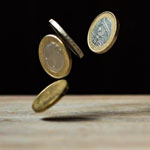Euro Day Date in the current year: January 1, 2026
 Euro Day is celebrated annually on January 1 to commemorate the day when the euro came into existence in 1999 and entered into circulation in 2002. The holiday is not by any means official, but that doesn’t mean it is not worthy of your attention.
Euro Day is celebrated annually on January 1 to commemorate the day when the euro came into existence in 1999 and entered into circulation in 2002. The holiday is not by any means official, but that doesn’t mean it is not worthy of your attention.The euro is the official currency of some member states of the European Union, known collectively as the eurozone. In addition to 19 countries of the eurozone, the euro is used by four microstates that are not members of the EU (Andorra, Monaco, San Marino and Vatican), a number of overseas territories of EU members, the EU institutions, and unilaterally by Kosovo and Montenegro.
The idea to create a European currency was first voiced as early as 1929, but it took seven more decades for it to come to fruition. The process of creating an economic and monetary union in Europe began in earnest following the reunification of Germany in 1989.
In 1993, the Maastricht Treaty entered into force. Its goal was to create an economic monetary union for all member states of the European Union except for Denmark and the United Kingdom. The following year, the European Monetary Institute (forerunner to the European Central Bank) was established to oversee the creation of a European currency. There was much debate over the name of the currency, but the name euro was eventually agreed upon in December 1995.
The 11 countries that would be the first to adopt the euro were selected in 1998; all of them had to meet strict economic criteria. These countries were Austria, Belgium, Finland, France, Germany, Ireland, Italy, Luxembourg, the Netherlands, Portugal, and Spain. Since then, eight more countries have joined the eurozone: Cyprus, Estonia, Greece, Latvia, Lithuania, Malta, Slovakia, and Slovenia. All countries that have joined the European Union since 1993 are expected to adopt the euro as soon as they meet the criteria.
The euro officially came into existence on January 1, 1999, albeit not in a physical form. For the first three years, it was used in banking, electronic transfers, traveler’s cheques, etc. The participating countries continued to use their old currencies as legal tender, with their exchange rates locked, until the introduction of the euro notes and coins on January 1, 2002.
Some countries stopped using their former national currencies as legal tender immediately after the introduction of the euro notes and coins, while others had a transitional period. Additionally, most national banks continued to exchange old notes and coins for euros; in some countries, the exchange period lasted for several years, while others allow the exchange to this day.
The birthday of the euro is sometimes referred to as Euro Day. We can’t say that it is widely celebrated, especially taking into account that it falls on New Year’s day, when most people are busy with other things. However, if you find yourself with not much to do on January 1, you can read about the history of the euro and share the facts you’ve learned on social media with the hashtag #EuroDay to let others know about the holiday.
- Category
- Other Observances
- Country
- European Union
- Tags
- Euro Day, observances in Europe, observances in the European Union, European currency, euro